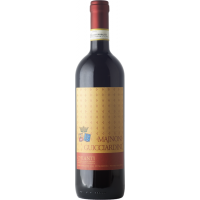 Majnoni Guicciardini (Tuscany, Italy)
Majnoni Guicciardini (Tuscany, Italy)
Majnoni Guicciardini (Tuscany, Italy)
A small, organic estate covering 200 hectares on the hills of the Elsa valley in the province of Florence, facing San Gimignano. The winery managed to maintain the crop diversification traditional in Tuscan farming.

The vineyards and wine production are the strategically most important activities, but the annual work cycle is integrated with other complementary activities such as olive growing, arable crops, woodland, and the upkeep of the Estate's premises.
The wines are fermented and matured in the Estate's ancient cellars. The most recent, built 50 years ago, is at Avanella, while the maturing cellar was built in 1920 and the storage cellar is in the mediaeval basement of the Estate's headquarters. Majnoni has made major investments in upgrading the cellars to the hygiene and technology standards of modern wine-making. The estate separates the vinification for each variety and vineyard, enabling to control the fermentation temperature. Majnoni winery is using short steeping for the reds with which they produce Tintero. To extract colour and polyphenols, however, the winery leaves the skins longer in the riper grapes that will go to produce the Chianti and - in the best years - Chianti Riserva. They also process a small quantity of green grapes to make Spareto, fermenting them partly in steel vats and partly in barriques.
It is mainly the more structured wines, such as our Riserva and sometimes also our Chianti, that we mature in wood. The majority of French oak barriques have a 350 litre capacity and are used many times over, more for their ability to ensure that the wine develops well than to obtain the spiciness typical of wines matured in wood.
The winery has won a number of prices and awards mainly for their typical, classic, organic, and well-priced Chianti Superiore DOCG.
Ex Tax: SGD29.00
Ex Tax: SGD38.00


/Chianti-Docg-Riserva-2011-200x200.png)